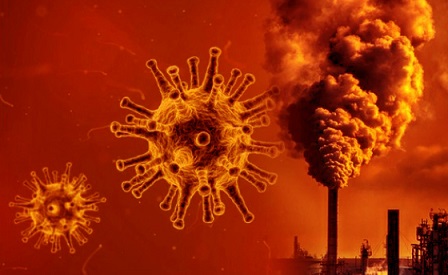Taiwanese Study Finds That PM2.5 Particles in Polluted Air Increases Risk of COVID-19 Infection
Nikhil Prasad Fact checked by:Thailand Medical news Team Dec 15, 2024 3 months, 4 weeks, 23 hours, 53 minutes ago
Medical News: Researchers from the National Yang Ming Chiao Tung University in Taiwan have provided groundbreaking insights into how particulate matter 2.5 (PM2.5) air pollution influences the risk of COVID-19 infections. PM2.5 consists of microscopic solid and liquid particles suspended in the air, small enough to penetrate deep into the lungs, causing serious health issues. This
Medical News report delves into their findings, which highlight how PM2.5 enhances the infectivity of the SARS-CoV-2 virus by modulating the expression of angiotensin-converting enzyme II (ACE2), a protein crucial to the virus’s ability to enter human cells. The study used a combination of animal models and laboratory experiments to explore this link.
 Taiwanese Study Finds That PM2.5 Particles in Polluted Air Increases Risk of COVID-19 Infection
Background on PM2.5 and SARS-CoV-2
Taiwanese Study Finds That PM2.5 Particles in Polluted Air Increases Risk of COVID-19 Infection
Background on PM2.5 and SARS-CoV-2
PM2.5 pollution and the COVID-19 pandemic are two significant health crises affecting millions worldwide. While earlier statistical studies revealed a positive correlation between high levels of air pollution and increased COVID-19 cases and mortality, there had been little direct experimental evidence explaining the mechanisms behind this relationship. SARS-CoV-2, the virus responsible for COVID-19, uses ACE2 as its primary receptor to invade human cells. ACE2 plays a dual role - it facilitates viral entry while also offering protective effects against inflammation and injury in the lungs.
The study explores how PM2.5 exposure alters ACE2 expression by causing an upregulation of ACE2 expression and increases the likelihood of SARS-CoV-2 infection. The research employed human ACE2 transgenic mice (K18-hACE2 TG), wild-type mice, and mice with ACE2 gene knockout (mACE2 KO) to investigate the relationship between PM2.5 exposure, ACE2 levels, and lung damage.
Key Findings of the Study
-PM2.5 as a Carrier and Amplifier of ACE2 Expression
The study confirmed that PM2.5 can act as an environmental carrier, potentially enhancing the spread of SARS-CoV-2. In laboratory experiments, exposure to PM2.5 increased ACE2 expression in lung cells, thereby facilitating viral entry. In vivo experiments showed that mice exposed to PM2.5 experienced higher levels of lung damage and inflammation compared to unexposed mice.
-Role of ACE2 in Lung Health
The researchers observed that ACE2’s role in the lungs is complex. On one hand, increased ACE2 expression allows SARS-CoV-2 to bind and infect cells more efficiently. On the other hand, ACE2 mitigates inflammation and protects the lungs from injury caused by PM2.5 exposure. This dual role makes ACE2 a “double-edged sword” in respiratory health.
-Inflammatory Pathways and Protein Dysregulation
The study demonstrated that PM2.5 exposure dysregulates key proteins in the renin-angiotensin system (RAS), which includes ACE and ACE2. PM2.5 instillation in mice significantly increased the levels
of pro-inflammatory cytokines like tumor necrosis factor-alpha (TNF-α) and interleukin-6 (IL-6). Additionally, PM2.5 activated the mitogen-activated protein kinase (MAPK) pathway, a signaling route associated with inflammation and cell stress.
Findings from Animal Models
The researchers observed severe lung damage in mice lacking ACE2 (mACE2 KO) when exposed to PM2.5, highlighting the protective role of ACE2 against PM2.5-induced injury. Conversely, transgenic mice with human ACE2 genes (K18-hACE2 TG) showed increased susceptibility to SARS-CoV-2 infection upon PM2.5 exposure, underscoring the heightened risk posed by air pollution to individuals exposed to the virus.
Implications for Public Health
The findings emphasize the interplay between environmental pollution and infectious diseases. PM2.5’s ability to amplify the infectivity of SARS-CoV-2 suggests that individuals living in areas with high air pollution are at a greater risk of severe COVID-19 outcomes. This underscores the need for stringent air quality regulations, particularly in urban and industrial areas.
Study Conclusions
This study sheds light on how PM2.5 pollution exacerbates the risk of SARS-CoV-2 infection by upregulating ACE2 expression. PM2.5 not only facilitates viral entry but also worsens lung inflammation and damage through dysregulation of the renin-angiotensin system and activation of inflammatory pathways. While ACE2 provides some protection against PM2.5-induced injury, its upregulation increases susceptibility to viral infection, creating a paradoxical scenario. Addressing air pollution could therefore play a vital role in mitigating the spread and severity of COVID-19.
The study findings were published in the peer-reviewed Journal of Hazardous Materials.
https://www.sciencedirect.com/science/article/abs/pii/S030438942403468X
For the latest COVID-19 News, keep on logging to Thailand
Medical News.
Read Also:
https://www.thailandmedical.news/news/how-air-pollution-worsens-the-impact-of-covid-19-on-our-lungs
https://www.thailandmedical.news/news/u-s-study-shows-that-exposure-to-air-pollutants-can-exacerbate-the-effects-of-a-covid-19-infection
https://www.thailandmedical.news/news/thailand-medical-study-finds-that-long-term-air-pollution-exposure-disrupts-kynurenine-pathway-elevating-disease-risks
https://www.thailandmedical.news/articles/coronavirus
Follow Us on:
https://x.com/ThailandMedicaX
https://bsky.app/profile/thailandmedical.bsky.social
https://www.facebook.com/ThailandMedicalNews
https://gettr.com/user/thailandmedicalnews
https://www.tribel.com/thailandmedical/wall
